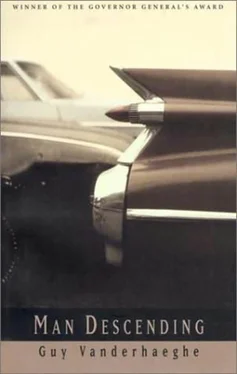When I was a boy it was a good deal bleaker. The topsoil had blown off the fields and into the ditches to form black dunes; the crops were withered and burnt; there were no sloughs because they had all dried up. The whole place had a thirsty look. That was during the thirties when we were dealt a doubly cruel hand of drought and economic depression. It was not a time or place that was kindly to my father. He had come out of the urban sprawl of industrial Belgium some twenty-odd years before, and it was only then, I think, that he was beginning to come to terms with a land that must have seemed forbidding after his own tiny country, so well tamed and marked by man. And then this land played him the trick of becoming something more than forbidding; it became fierce, and fierce in every way.
It was in the summer of 1931, the summer that I thought was merely marking time before I would pass into high school, that he lost his territory. For as long as I could remember I had been a salesman’s son, and then it ended. The company he worked for began to feel the pinch of the depression and moved to merge its territories. He was let go. So one morning he unexpectedly pulled up at the front door and began to haul his sample cases out of the Ford.
“It’s finished,” he said to my mother as he flung the cases on to the lawn. “I got the boot. I offered to stay on – strictly commission. He wouldn’t hear of it. Said he couldn’t see fit to starve two men where there was only a living for one. I’d have starved that other sonofabitch out. He’d have had to hump his back and suck the hind tit when I was through with him.” He paused, took off his fedora and nervously ran his index finger around the sweat-band. Clearing his throat, he said, “His parting words were ‘Good luck, Dutchie!’ I should have spit in his eye. Jesus H. Christ himself wouldn’t dare call me Dutchie. The bastard.”
Offence compounded offence. He thought he was indistinguishable, that the accent wasn’t there. Maybe his first successes as a salesman owed something to his naivete. Maybe in good times, when there was more than enough to go around, people applauded his performance by buying from him. He was a counterfeit North American who paid them the most obvious of compliments, imitation. Yet hard times make people less generous. Jobs were scarce, business was poor. In a climate like that, perceptions change, and perhaps he ceased to be merely amusing and became, instead, a dangerous parody. Maybe that district manager, faced with a choice, could only think of George Vander Elst as Dutchie. Then again, it might have been that my father just wasn’t a good enough salesman. Who can judge at this distance?
But for the first time my father felt as if he had been exposed. He had never allowed himself to remember that he was a foreigner, or if he had, he persuaded himself he had been wanted. After all, he was a northern European, a Belgian. They had been on the preferred list.
He had left all that behind him. I don’t even know the name of the town or the city where he was born or grew up. He always avoided my questions about his early life as if they dealt with a distasteful and criminal past that was best forgotten. Never, not even once, did I hear him speak Flemish. There were never any of the lapses you might expect. No pet names in his native language for my mother or myself; no words of endearment which would have had the comfort of childhood use. Not even when driven to one of his frequent rages did he curse in the mother tongue. If he ever prayed, I’m sure it was in English. If a man forgets the cradle language in the transports of prayer, love, and rage – well, it’s forgotten.
The language he did speak was, in a sense, letter-perfect, fluent, glib. It was the language of wheeler-dealers, and of the heady twenties, of salesmen, high-rollers, and persuaders. He spoke of people as live-wires, go-getters, self-made men. Hyphenated words to describe the hyphenated life of the seller, a life of fits and starts, comings and goings. My father often proudly spoke of himself as a self-made man, but this description was not the most accurate. He was a remade man. The only two pictures of him which I have in my possession are proof of this.
The first is a sepia-toned photograph taken, as nearly as I can guess, just prior to his departure from Belgium. In this picture he is wearing an ill-fitting suit, round-toed, clumsy boots, and a cloth cap. The second was taken by a street photographer in Winnipeg. My father is walking down the street, a snap-brim fedora slanting rakishly over one eye. His suit is what must have been considered stylish then – a three-piece pin-stripe – and he is carrying an overcoat casually over one arm. He is exactly what he admired most, a “snappy dresser,” or, since he always had trouble with his p’s, a “snabby dresser.” The clothes, though they mark a great change, aren’t really that important. Something else tells the story.
In the first photograph my father stands rigidly with his arms folded across his chest, unsmiling. Yet I can see that he is a young man who is hesitant and afraid; not of the camera, but of what this picture-taking means. There is a reason why he is having his photograph taken. He must leave something of himself behind with his family so he will not be forgotten, and carry something away with him so that he can remember. That is what makes this picture touching; it is a portrait of a solitary, an exile.
In the second picture his face is blunter, fleshier: nothing surprising in that, he is older. But suddenly you realize he is posing for the camera – not in the formal, European manner of the first photograph but in a manner far more unnatural. You see, he is pretending to be entirely natural and unguarded; yet he betrays himself. The slight smile, the squared shoulder, the overcoat draped over the arm, all are calculated bits of a composition. He has seen the camera from a block away. My father wanted to be caught in exactly this negligent, unassuming pose, sure that it would capture for all time his prosperity, his success, his adaptability. Like most men, he wanted to leave a record. And this was it. And if he had coached himself in such small matters, what would he ever leave to chance?
That was why he was so ashamed when he came home that summer. There was the particular shame of having lost his job, a harder thing for a man then than it might be today. There was the shame of knowing that sooner or later we would have to go on relief, because being a lavish spender he had no savings. But there was also the shame of a man who suddenly discovers that all his lies were transparent, and everything he thought so safely hidden had always been in plain view. He had been living one of those dreams. The kind of dream in which you are walking down the street, meeting friends and neighbours, smiling and nodding, and when you arrive at home and pass a mirror you see for the first time you are stark naked. He was sure that behind his back he had always been Dutchie. For a man with so much pride a crueller epithet would have been kinder; to be hated gives a man some kind of status. It was the condescension implicit in that diminutive, its mock playfulness, that made him appear so undignified in his own eyes.
And for the first time in my life I was ashamed of him. He didn’t have the grace to bear an injustice, imagined or otherwise, quietly. At first he merely brooded, and then like some man with a repulsive sore, he sought pity by showing it. I’m sure he knew that he could only offend, but he was under a compulsion to justify himself. He began with my mother by explaining, where there was no need for explanation, that he had had his job taken from him for no good reason. However, there proved to be little satisfaction in preaching to the converted, so he carried his tale to everyone he knew. At first his references to his plight were tentative and oblique. The responses were polite but equally tentative and equally oblique. This wasn’t what he had hoped for. He believed that the sympathy didn’t measure up to the occasion. So his story was told and retold, and each time it was enlarged and embellished until the injustice was magnified beyond comprehension. He made a damn fool of himself. This was the first sign, although my mother and I chose not to recognize it.
Читать дальше












